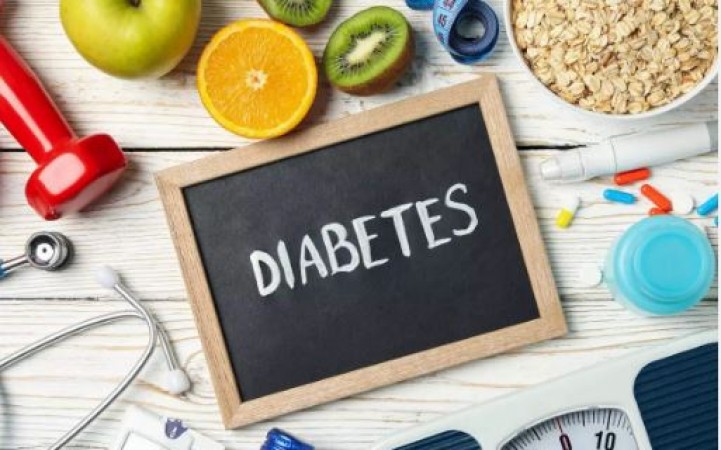
Diabetes is a chronic condition where the body either does not produce enough insulin or cannot effectively use the insulin it produces. This results in elevated levels of glucose in the blood, leading to various health complications. The number of diabetes cases is on the rise globally, including in countries like India.
There are two main types of diabetes:
Type 1 Diabetes: This occurs when the body's immune system attacks and destroys insulin-producing cells in the pancreas. It is often diagnosed in children and young adults but can occur at any age.
Type 2 Diabetes: This occurs when the body either doesn't produce enough insulin or becomes resistant to insulin's effects. It is more common than type 1 diabetes and is often associated with lifestyle factors such as obesity and physical inactivity.
Approximately 8% of diabetes cases worldwide are type 1, while 90% are type 2.
Managing diabetes involves a combination of medication, lifestyle changes, and dietary modifications. Here are some foods and habits to avoid in order to control blood sugar levels effectively:
1. Trans Fats:
Trans fats are unsaturated fats that undergo a process called hydrogenation, which makes them solid at room temperature and increases their shelf life. These fats are commonly found in processed foods, fried foods, and commercially baked goods.
In individuals with diabetes, consuming trans fats can exacerbate cardiovascular risk factors such as high cholesterol levels and inflammation. Trans fats not only raise "bad" LDL cholesterol but also lower "good" HDL cholesterol, leading to an increased risk of heart disease and stroke.
To avoid trans fats, it's essential to read food labels carefully. Foods containing partially hydrogenated oils or hydrogenated oils likely contain trans fats and should be avoided. Instead, opt for healthier fats such as monounsaturated and polyunsaturated fats found in nuts, seeds, avocados, and olive oil.
2. High Glycemic Index Fruits:
The glycemic index (GI) measures how quickly carbohydrates in food raise blood sugar levels. Foods with a high GI are rapidly digested and absorbed, causing a spike in blood sugar levels. This can be problematic for individuals with diabetes, as it can lead to hyperglycemia.
High GI fruits include watermelon, pineapples, and ripe bananas. These fruits should be consumed in moderation by individuals with diabetes to prevent sharp increases in blood sugar levels. Instead, focus on low GI fruits such as berries, apples, pears, and citrus fruits, which have a slower impact on blood sugar levels.
3. Refined Flour:
Refined flour undergoes processing that removes the bran and germ, stripping away fiber, vitamins, and minerals. What remains is the starchy endosperm, which is rapidly converted into glucose upon digestion, causing blood sugar levels to spike.
Foods made from refined flour, such as white bread, pasta, pastries, and baked goods, should be limited or avoided by individuals with diabetes. Instead, choose whole grain alternatives such as whole wheat bread, brown rice, quinoa, and oats, which contain more fiber and nutrients and have a lower impact on blood sugar levels.
4. Fried Foods:
Fried foods are typically high in unhealthy fats and calories, making them a poor choice for individuals with diabetes. When foods are fried, they absorb large amounts of oil, adding excess calories and unhealthy fats to the diet.
The consumption of fried foods has been linked to an increased risk of obesity, heart disease, and type 2 diabetes. In addition to raising blood sugar levels, fried foods can contribute to insulin resistance and inflammation in the body.
To reduce the intake of fried foods, opt for healthier cooking methods such as baking, grilling, steaming, or sautéing with minimal oil. Choose lean proteins, such as chicken, fish, and tofu, and incorporate plenty of vegetables into meals for added nutrition.
5. Alcohol:
Alcohol can have a significant impact on blood sugar levels, especially when consumed in large amounts or on an empty stomach. It can cause hypoglycemia by impairing the liver's ability to release glucose into the bloodstream, leading to dangerously low blood sugar levels.
In addition to its effects on blood sugar, alcohol can also interfere with diabetes medications and increase the risk of complications such as liver disease and neuropathy. Individuals with diabetes should limit their alcohol intake and consume alcoholic beverages in moderation, if at all.
When drinking alcohol, it's important to monitor blood sugar levels closely and avoid sugary mixers and cocktails. Opt for light beer, dry wines, or spirits mixed with sugar-free mixers or sparkling water. Always drink responsibly and be mindful of how alcohol affects blood sugar levels.
6. Excessive Salt:
High sodium intake has been linked to an increased risk of high blood pressure, heart disease, stroke, and kidney disease, all of which are common complications of diabetes. Excess sodium can cause the body to retain water, leading to fluid retention and elevated blood pressure.
Individuals with diabetes should aim to limit their sodium intake to less than 2,300 milligrams per day, or even lower if they have high blood pressure or other cardiovascular risk factors. This can be achieved by reducing the consumption of processed and packaged foods, which are often high in sodium.
Instead of salt, flavor foods with herbs, spices, citrus juice, vinegar, and other low-sodium seasonings. Choose fresh, whole foods whenever possible and cook meals at home to have better control over sodium content. Reading food labels can also help identify hidden sources of sodium in packaged foods.
In conclusion, managing diabetes requires careful attention to diet and lifestyle factors. By avoiding certain foods and habits that can spike blood sugar levels, individuals with diabetes can better control their condition and reduce the risk of complications. It is essential to work closely with a healthcare professional to develop a personalized diabetes management plan that includes dietary guidelines tailored to individual needs.